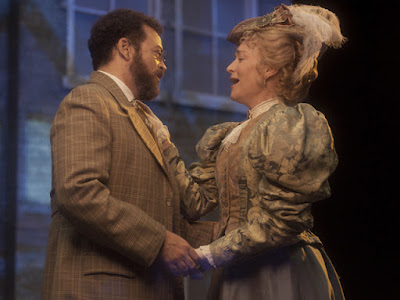Nathan Granner and Marnie Breckenridge in Gordon Getty’s opera “Goodbye, Mr. Chips”
There is nothing new about filming opera. Indeed one can find almost every opera in a filmed version on YouTube. The past decade has shown a major advance with the advent of opera in HD. In this case, the film directors have become as important as the stage directors in that they can focus the attention of the audience on a particular singer or some small but significant stage object that only front row audience members might have seen during the live performance.
Last week at the Walter Reade Theater, we were introduced to a further advance in the field, which is "opera reimagined for film". It was easy to perceive "Goodbye, Mr. Chips" as a film with award-winning music composed by Gordon Getty, music which amplified the drama. The story began life as a 1934 novella by James Hilton and tells the story of a revered teacher at a British boarding school in the early years of the 20th c.
The eponymous teacher (tenor Nathan Granner), long a bachelor, had his life changed by falling in love with and marrying the lovely Kathie (soprano Marnie Breckenridge). Her lamentable death in childbirth did not put an end to his personal and professional growth. There is yet more sorrow as he lives to witness the death of several of his former students in World War I. There is not much conflict, just a difference of opinion with snarky new Headmaster Ralston, played to the hilt by bass-baritone Kevin Short, who wants Latin taught in a new way. Parental support of Mr. Chips prevails.
As a film, this hybrid worked reasonably well. There is a narrator--Merrivale, well played by baritone Lester Lynch; there is a succession of scenes that tell the story logically with clearly inserted flashbacks; there are some "tricks of the trade" best known to film people (of which I am not) that permitted the overlapping of images of Mr. Chips as a young man with his younger self. The students of the school were somehow projected onto the set although they were obviously not present.
The set worked fairly well although a revolving element, commonly used on the theater stage, kept revolving and revolving at one point, and to no apparent purpose. The turn of the 20th c. costuming was apropos with Kathie wearing a gorgeous dress.
Director Brian Staufenbiel managed to coordinate the diverse element to form a cohesive whole with the orchestra, conducted by Nicole Paiement, recorded separately.
The opera side of this synthesis was a mixed bag. The instrumental writing left nothing to be desired. It neatly supported the onstage drama in a most effective way, which led us to think of this as an award-winning soundtrack to a film. However, the vocal lines did not "sing" and there was no melody to speak of (or to sing of). We wish contemporary composers would take a page from Broadway's book and give the audience the tunes our ears are hungry for.
The singing of the members of the Young People’s Chorus of New York City, on the other hand, was pure delight as they joined their voices in singing what was probably a hymn or an anthem. One may scoff, but it had melody.
The cast of four did everything they could to make the prosy text musical. Since Mr. Getty wrote the libretto himself, there is no one else to blame for the lack of musicality. Mr. Granner was outstanding, not only for his velvet tone but for fine phrasing that almost compensated for the meandering vocal line. Ms. Breckenridge made a lovely Kathie and we were sorry her character got killed off so early in the film. Mr. Lynch was a believable Merrivale, a former student who is sharing his memories of Mr. Chips. Mr. Short was equally convincing as the hostile new headmaster who had to change his tone when he needed help from Mr. Chips at the end of the film.
There were several scenes that just begged for an old-fashioned aria or duet.
This work was originally conceived as a staged opera and, like so many other projects derailed by the pandemic, had to be reinvented. The world premiere took place last November as part of Festival Napa Valley and Mill Valley Film Festival. This New York premiere was presented by Festival Napa Valley and New York City Opera.
We invite you, dear reader, to add your comments. An experiment like this is sure to arouse all kinds of opinions.
© meche kroop

No comments:
Post a Comment